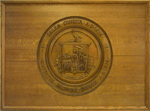Salem Fire: Difference between revisions
From Salem Links and Lore
No edit summary |
No edit summary |
||
| Line 1: | Line 1: | ||
*The famous Salem Fire of 1914 was one of the largest fire in the history of Massachusetts. Burning about 1,920 acres or two square miles, the Salem blaze began in the early afternoon of June 25, 1914, at Korn Leather Co. factory at 55 Boston St. in the city's Blubber Hollow section of town. It spread to 20 factories, mostly used for leather-working. The wind pushed the fire toward south Salem, spreading to wooden residences and crossing the railroad tracks into South Salem. | *The famous Salem Fire of 1914 was one of the largest fire in the history of Massachusetts. Burning about 1,920 acres or two square miles, the Salem blaze began in the early afternoon of June 25, 1914, at Korn Leather Co. factory at 55 Boston St. in the city's Blubber Hollow section of town. It spread to 20 factories, mostly used for leather-working. The wind pushed the fire toward south Salem, spreading to wooden residences and crossing the railroad tracks into South Salem. | ||
After the fire had run its course, the damage was assessed: 20,000 homeless, 50 people injured, 1,000 buildings burned and total loss estimated at 12,000,000. | *After the fire had run its course, the damage was assessed: 20,000 homeless, 50 people injured, 1,000 buildings burned and total loss estimated at 12,000,000. | ||
The 200 children from the Orphanage on Lafayette Street were removed safely to Salem Willows, as were some of the patients from the hospitals, though some were take to Danvers Hospital. | *The 200 children from the Orphanage on Lafayette Street were removed safely to Salem Willows, as were some of the patients from the hospitals, though some were take to Danvers Hospital. | ||
Forest River Park and Bertram Field were both used for relief camps. Bertram Field had 152 tents with 470 occupants while Forest River Camp accommodated 1,500 people in 400 tents. The Salem Militia and the Red Cross set up and ran these and other food relief efforts. | *Forest River Park and Bertram Field were both used for relief camps. Bertram Field had 152 tents with 470 occupants while Forest River Camp accommodated 1,500 people in 400 tents. The Salem Militia and the Red Cross set up and ran these and other food relief efforts. | ||
One of the worst losses was St. Joseph Church, a twin-towered structure on Lafayette street erected only a few years before the fire. | *One of the worst losses was St. Joseph Church, a twin-towered structure on Lafayette street erected only a few years before the fire. | ||
Revision as of 08:56, 16 April 2010
- The famous Salem Fire of 1914 was one of the largest fire in the history of Massachusetts. Burning about 1,920 acres or two square miles, the Salem blaze began in the early afternoon of June 25, 1914, at Korn Leather Co. factory at 55 Boston St. in the city's Blubber Hollow section of town. It spread to 20 factories, mostly used for leather-working. The wind pushed the fire toward south Salem, spreading to wooden residences and crossing the railroad tracks into South Salem.
- After the fire had run its course, the damage was assessed: 20,000 homeless, 50 people injured, 1,000 buildings burned and total loss estimated at 12,000,000.
- The 200 children from the Orphanage on Lafayette Street were removed safely to Salem Willows, as were some of the patients from the hospitals, though some were take to Danvers Hospital.
- Forest River Park and Bertram Field were both used for relief camps. Bertram Field had 152 tents with 470 occupants while Forest River Camp accommodated 1,500 people in 400 tents. The Salem Militia and the Red Cross set up and ran these and other food relief efforts.
- One of the worst losses was St. Joseph Church, a twin-towered structure on Lafayette street erected only a few years before the fire.
